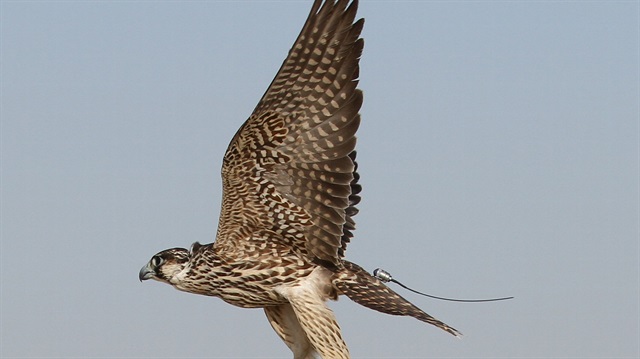
Thousands of Bahri falcons sold to wealthy Arabs for use in hunting, wildlife officials say
Pakistan's national poet Allama Iqbal frequently referred to the Shaheen falcon in his poetry -- clearly in awe of the bird as it glided through the skies.
However, the Shaheen, also called the Bahri falcon, is fast disappearing from the country’s skies due to the illegal trade with the Middle East.
The bird, declared endangered by the Convention on International Trade in Endangered Species, hails from northern Europe and the Russian Arctic but migrates to warmer countries such as Pakistan, India and Bangladesh during the winter.
Bahri, which means “of the ocean” in Arabic, refers to the bird's natural habitat near lakes and coastal areas.
The birds are sold to wealthy Arabs who train them for faAralconry -- a centuries-old art of hunting wild prey with trained falcons and hawks.
Humaira Aisha, an official at the Karachi chapter of the World Wildlife Fund told Anadolu Agency that the illegal trade had seen the bird’s population dwindle.
The female falcon -- stronger and bigger than the male -- is the prime choice for buyers, Aisha said. An ordinary bird is sold for 500,000 to 1 million Pakistani rupees ($4,745 to $9,490).
Tahir Quershi, an official at International Union for Conservation of Nature in Karachi said a stronger female bird could fetch up to 5 million rupees ($47,450).
In southern Sindh province, where the birds flock to warm lakes and coasts, Mumtaz Soomro, an official with the wildlife department, confirmed the bird’s population had declined over the past decade.
“We have seized dozens of Bahris in recent months during raids in different parts of the province as part of the government’s campaign aimed at protecting the endangered bird,” Soomro told Anadolu Agency.
- 6,000 falcons smuggled
Some independent estimates say there has been a 50 to 60 percent decline in the number of falcons in Pakistan in the last decade.
According to a government climate change official, who spoke on condition of anonymity due to restrictions on talking to the media, around 6,000 falcons -- 70 per cent of them Bahris -- are smuggled to the Middle East every year.
Naeem Ashraf Raja, biodiversity director at the Climate Change Ministry, declined to confirm or deny the figures but said: “It is quite possible.”
The government has placed life-sized billboards at airports warning against the smuggling of Bahri falcons but penalties remain relatively light when measured against the potential rewards.
The maximum punishment for a smuggler is a 50,000 rupee ($475) fine or a six-month jail term -- a degree of deterrent that Raja said undermined protection efforts.
Trained Bahris are used for hunting the endangered Houbra bustard that is also found in southwestern Pakistan. The chicken-sized bustard is largely hunted by rich Arabs who consider its meat an aphrodisiac.
Arab royals frequently visit Pakistan at the invitation of local politicians and government officials, who arrange hunting safaris for them.
In 2015, Pakistan’s top court ordered a blanket ban on the hunting of rare birds and animals. However, the ban was partially lifted in 2016 after the government filed a petition arguing that hunting formed the “cornerstone” of diplomatic ties with Middle Eastern countries.
“Truly speaking, no one has the exact figures as to how many falcons are smuggled out annually,” Qureshi said.
“These all are estimates, which could be right or wrong. No wildlife official can dare to check powerful local poachers and wealthy foreign buyers.”
However, if the current rate of smuggling is maintained, many fear that future generations of Pakistanis will have little understanding of Iqbal’s description of the graceful Shaheen.


